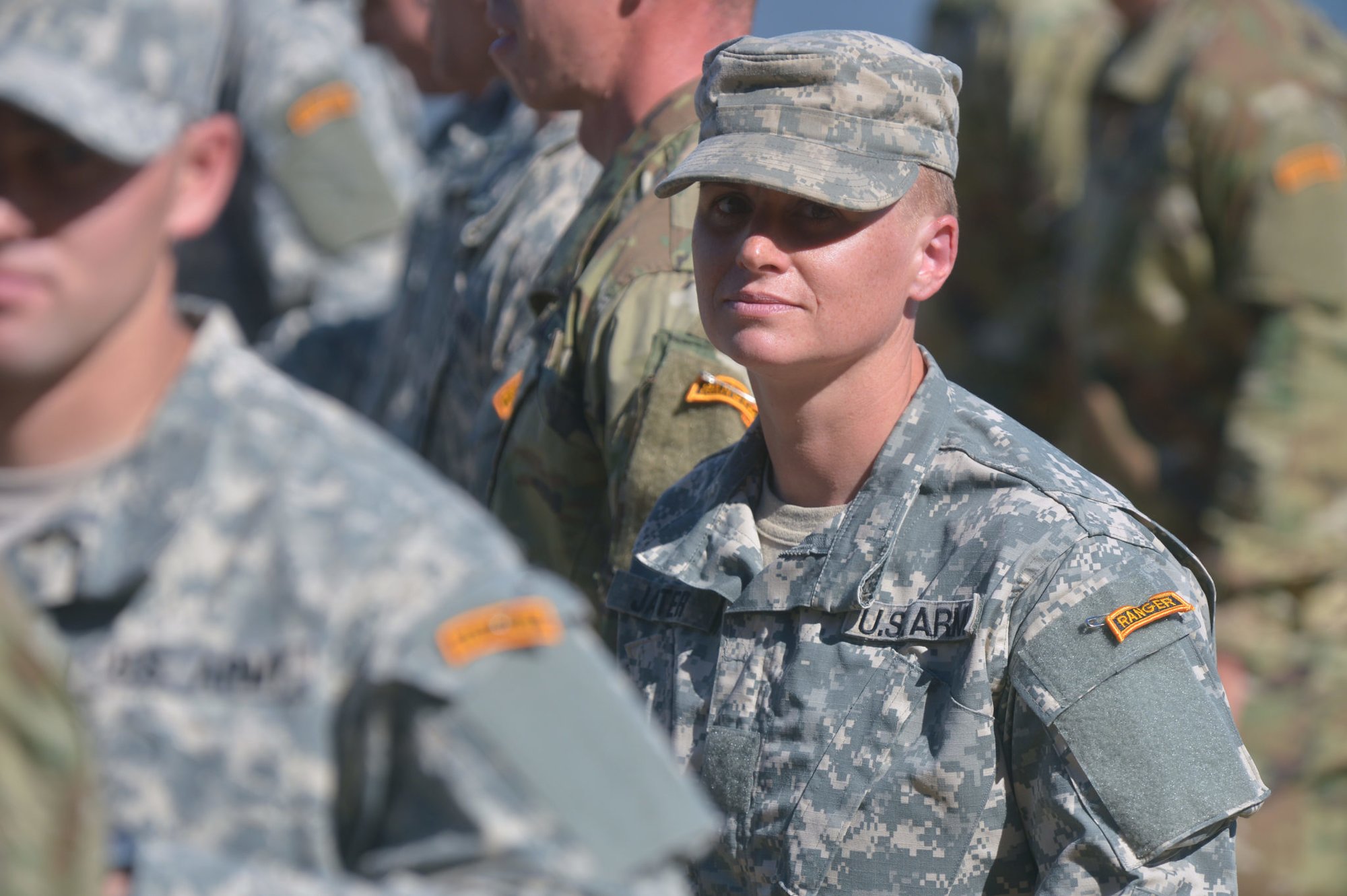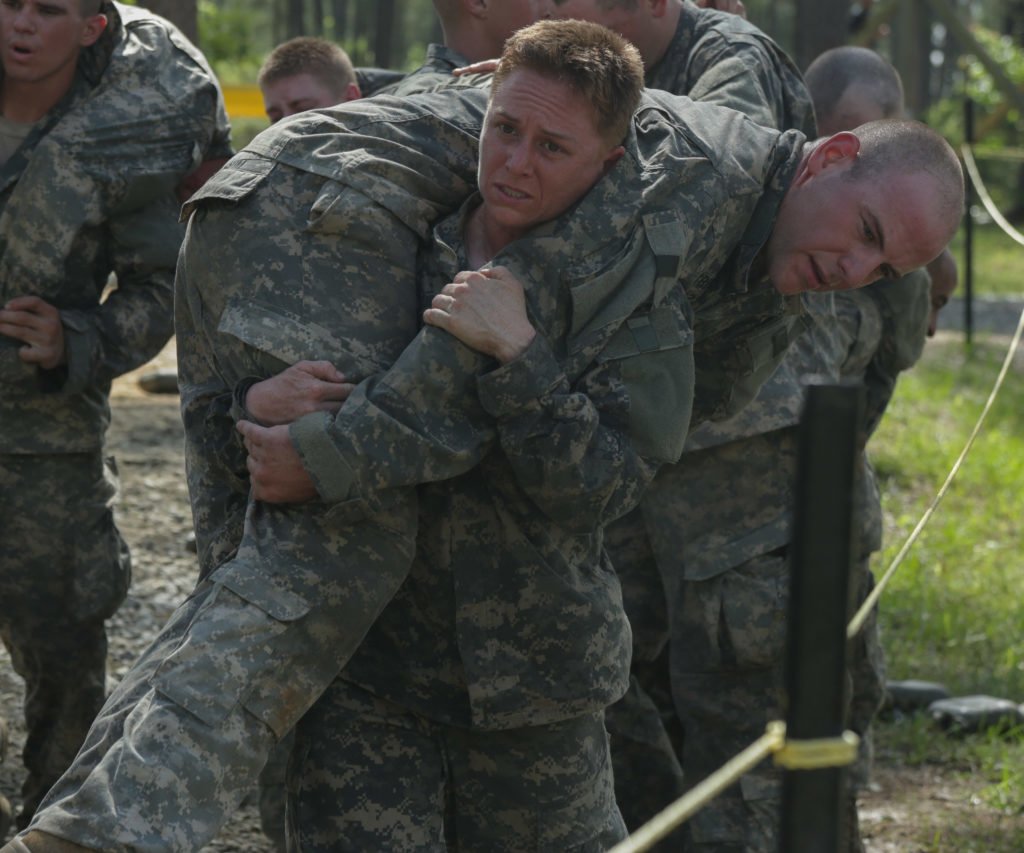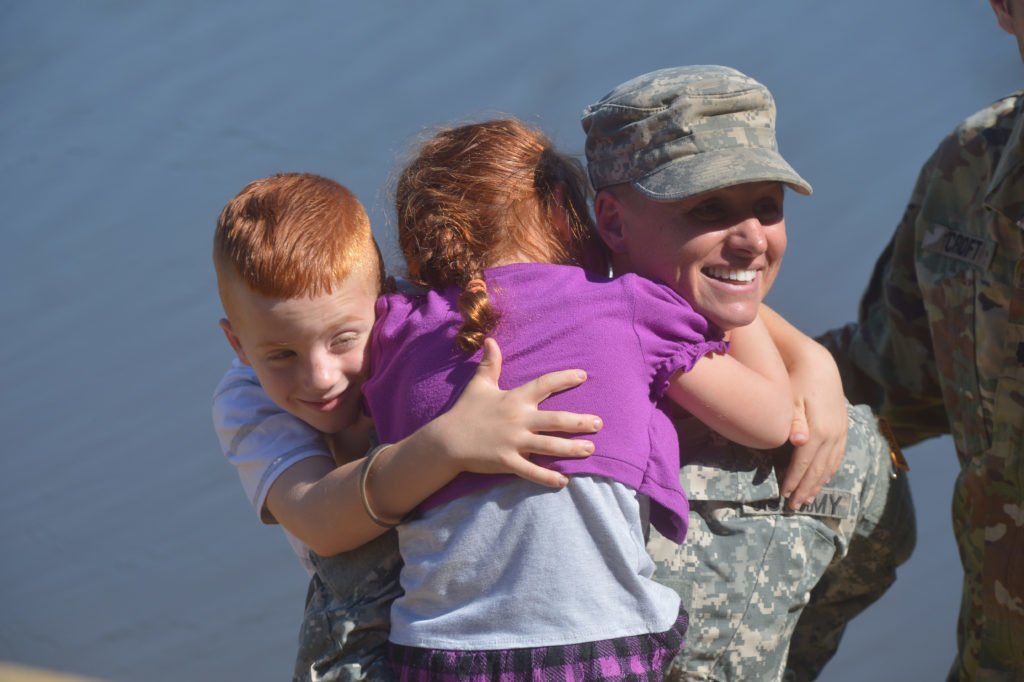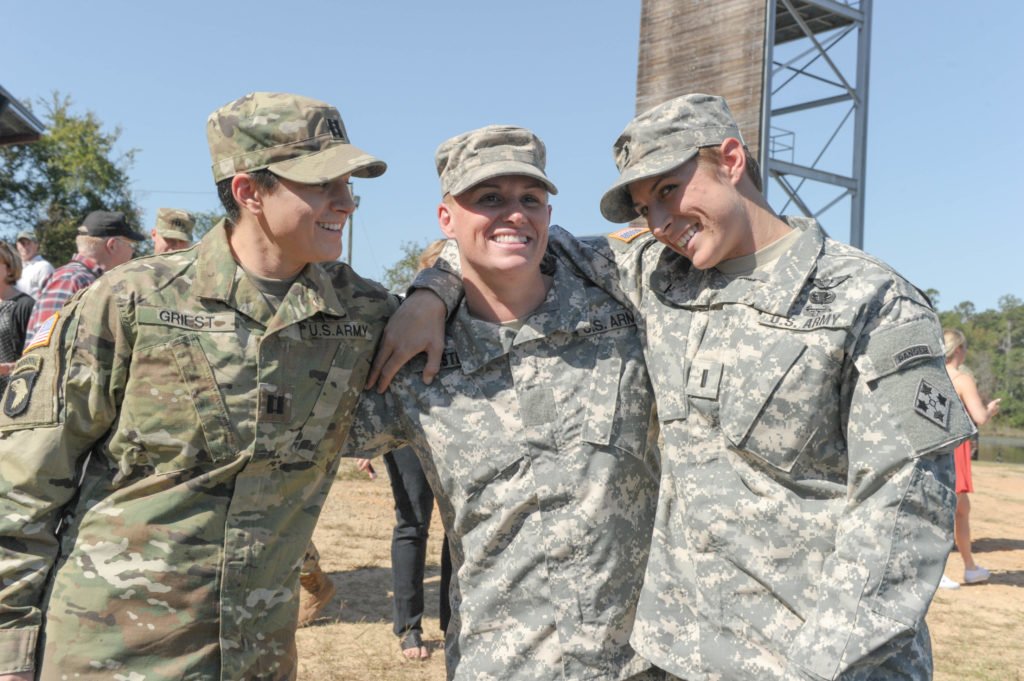West Point and Ranger School Graduate Lisa Jaster on Earning the Tab

U.S. Army Maj. Lisa Jaster stands in formation during the Ranger School graduation on Fort Benning, Ga., Oct. 16, 2015. Jaster is the third female Ranger School graduate. (U.S. Army photo by Staff Sgt. Alex Manne/ Released)
U.S. Army Major Lisa Jaster hadn’t necessarily been one to make waves during her military career when her sergeant major approached her with an unexpected suggestion in 2015.
“I really feel like the military has given me a ton of amazing opportunities that a girl from small-town Wisconsin would have never ever ever experienced if it wasn’t for the military,” Jaster said. “So I’d never really felt like, I want to make change, I want to be an influencer.”
But her boss had other ideas. He proposed that she be one of the first women to go to Ranger School, an intense 62-day small unit tactics and leadership course that had been previously open only to men.
After graduating from West Point in 2002, Jaster served in the Army’s engineer branch for seven years before retiring and establishing a civilian career. She rejoined as a reservist in 2012 and skillfully balanced her work, her service, and her family. So when Ranger School was suggested, her immediate reaction was to turn it down.

“I’m not really at that point in my career anymore where I plan on sleeping out in the woods,” she recalled thinking at the time. “Not saying I don’t want to be a snake eater, but I’d like to eat a snake cooked in a crock pot.” But a few months later, she found herself with two weeks to prepare to be one of only 160 women chosen to attend the Ranger Training and Assessment Course (RTAC).
“I had on my signature block at the time an Einstein quote that said, ‘A ship is always safe at the shore, but that is not what it is built for,’” Jaster said. “That quote was kind of the catalyst for this discussion between my husband and I. He was like, ‘You were built for this — you were built to be that woman who makes change, who influences change.’ I had always thought of myself as somebody who was willing to put myself out there, to go the extra mile, to try to do something that nobody else had tried, but I’d never tested that theory. So this was my opportunity to, instead of having a cute little phrase in my signature block, to actually either put up or shut up.”
There was an added level of scrutiny for the women who made it through RTAC and into Ranger School. “We were test dummies,” Jaster said. “I felt like we were poked and prodded a bit. We were an experiment. We were weird, and nobody knew if we were going to be successful.”

The men who arrived at Fort Benning with Jaster had not been forewarned that there would be women in their class. “A lot of them had preconceived notions of why we were there, what we were doing, what we were trying to prove,” she said. “After about five minutes they realized that whether we were there for the right or wrong reasons, we were still there, and we all had to work together.”
Jaster was the third woman to graduate from Ranger School, behind Captain Shaye Haver and First Lieutenant Kristen Griest. All in, it took her six months to finish, as she recycled each stage. “I would say if you can get through it in one try, please do,” Jaster said with a laugh. “I highly recommend not staying at Ranger School for six months.” But she ultimately sees her extended stay at Ranger School as an accomplishment, hoping that people will see it as, “She was at Ranger School for six months and she didn’t just decay in that period of time; she didn’t fall apart.”
Jaster stood out at Ranger School for characteristics beyond her gender — at a course where the average age is 23, she was 37 at the time. “When somebody wanted to be really hard on a young student, they’d be like, ‘Well, Grandma’s over there doing the rope climb, what’s wrong with you?’” Jaster said.

“Each class I recycled with had a new batch of men and young soldiers, and each and every one of those got to work next to a female who was carrying the same weight, who was doing the same thing that they were,” Jaster said about her time in the course. “Hopefully, when they’re in leadership roles moving forward in their careers, they’ve now worked with a woman who actually did do it. Maybe they’ll judge each of their soldiers by their individual capability, rather than their gender.”
Jaster understands how hard it is for some people to accept the idea of women with Ranger tabs. “If you’ve never met a Shaye Haver or a Kris Griest, you don’t know that women like that exist,” she said. “If we look around and all we know is, ‘Well, my mom could never do that or my sister wouldn’t be caught dead doing that,’ then how could you possibly fathom girls like us who not only can do it, but we want to?”
She also brushes off rumors that women were held to lower standards or were pushed through the course unfairly.
“Everybody and their brother seems to know a Ranger Instructor that told them the ‘real story,’ Jaster said. “Everybody seems to know this guy, but this guy has never come forward. So it’s this fictitious entity that people swear by. And short of calling every single person a liar, how do you fight this imaginary person?
“What’s easy now,” she continued, “is that fictitious person has never come forward. So if at some point in time someone comes forward and says, ‘Listen, I was a Ranger Instructor at Fourth Battalion, and this is how it happened, and this is how it was unfair, and this is how women cheated,’ that would be one thing. They could get a book deal. They would be famous if they came forward and said all the ways that women cheated at Ranger School. But nobody has. So it’s not as big of an issue as it once was.”
People are occasionally shocked to see a woman wearing a Ranger tab on her arm, and one time someone even asked to see her orders to prove that she had earned it.
“I didn’t handle it as well as I should have,” she recalled. “I told him to go ahead and Google me, which was not the right answer of course. I was with some of my soldiers at the time, and they thought it was hilarious that I told a senior NCO to Google me.”
To her family, she’s still the same person she’s always been. But one person whose perspective has changed forever because of Jaster’s accomplishments is her daughter. One day she looked at her mom in the reflection of the media spotlight and asked, “Hey mom? Do boys go to Ranger School?”
To learn more about Lieutenant Colonel Lisa Jaster’s life and military career, listen to her interview with Mike G. on episode 138 of the FieldCraft Survival podcast.

Maggie BenZvi is a contributing editor for Coffee or Die. She holds a bachelor’s degree in political science from the University of Chicago and a master’s degree in human rights from Columbia University, and has worked for the ACLU as well as the International Rescue Committee. She has also completed a summer journalism program at Northwestern University’s Medill School of Journalism. In addition to her work at Coffee or Die, she’s a stay-at-home mom and, notably, does not drink coffee. Got a tip? Get in touch!
BRCC and Bad Moon Print Press team up for an exclusive, limited-edition T-shirt design!
BRCC partners with Team Room Design for an exclusive T-shirt release!
Thirty Seconds Out has partnered with BRCC for an exclusive shirt design invoking the God of Winter.
Lucas O'Hara of Grizzly Forge has teamed up with BRCC for a badass, exclusive Shirt Club T-shirt design featuring his most popular knife and tiomahawk.
Coffee or Die sits down with one of the graphic designers behind Black Rifle Coffee's signature look and vibe.
Biden will award the Medal of Honor to a Vietnam War Army helicopter pilot who risked his life to save a reconnaissance team from almost certain death.
Ever wonder how much Jack Mandaville would f*ck sh*t up if he went back in time? The American Revolution didn't even see him coming.
A nearly 200-year-old West Point time capsule that at first appeared to yield little more than dust contains hidden treasure, the US Military Academy said.












